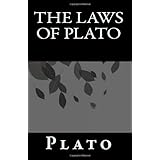
Average Reviews:

(More customer reviews)Plato's "Republic" is used most often in college courses to illustrate Plato's thoughts on politics, but it does not seem to contain a serious political program. The characters in the "Republic" are mostly young men not yet entrusted with political responsibility who are, nevertheless, concerned with justice and how a city would have to be composed in order to be fully just. That such a city could never, in fact, come about becomes less important than the questions of justice and soul that the discussion raises. Obviously (and by Plato's intention) the "Republic" does not present a practical political program. Students relying on this dialogue alone to get a sense of Plato's thoughts on the best regime may be led astray, especially if they are guided by a bad teacher (of which there are many in the universities). The best corrective to this is to read Pangle's translation of Plato's "Laws". In this dialogue an Athenian Stranger discusses various proposed laws with a Cretan who is shortly to assist in the founding of the new colony of Magnesia. The laws and regulations proposed by the Stranger are concessions to the way men are, rather than idealistic portraits of how they should be. The rule of philosopher-kings is not proposed, and the fact that all three interlocutors come from cities that at one time or another were at war with one another introduces a note of distrust and seriousness that is missing in the more playful "Republic"; this seriousness befits the discussion's more practical nature. Pangle's translation is literal and trustworthy where other translations take liberties with Plato's terminology, while the notes ameliorate the limitations of the translation form. If you are unsatisfied with this, prepare to learn the Greek since a better translation is not likely to be forthcoming. If Pangle's Interpretive Essay leaves a bad taste in your mout, feel free to read "The Argument and the Action of Plato's Laws" by Leo Strauss. My impression, however, is that Pangle's essay is more appropriate for readers who may find the unfamiliar "Laws" more, well, unfamiliar than, say, the "Republic". No one can deny that the "Laws" is more complex than the "Republic" and builds on many of that dialogue's insights, coming as it does at the end of Plato's career. To my mind, however, it is as indispensable as the "Republic" and teachers do their students a great disservice by not assigning the "Laws" more often. In conclusion, I highly recommend this dialogue and translation--accept no substitutes.
Click Here to see more reviews about: The Laws of Plato
The Laws of Plato, written by legendary author Plato is widely considered to be one of the greatest classic and historical texts of all time. This great classic will surely attract a whole new generation of readers. For many, The Laws of Plato is required reading for various courses and curriculums. And for others who simply enjoy reading timeless pieces of classic literature, this gem by Plato is highly recommended. Published by Classic Books International and beautifully produced, The Laws of Plato would make an ideal gift and it should be a part of everyone's personal library.

0 comments:
Post a Comment